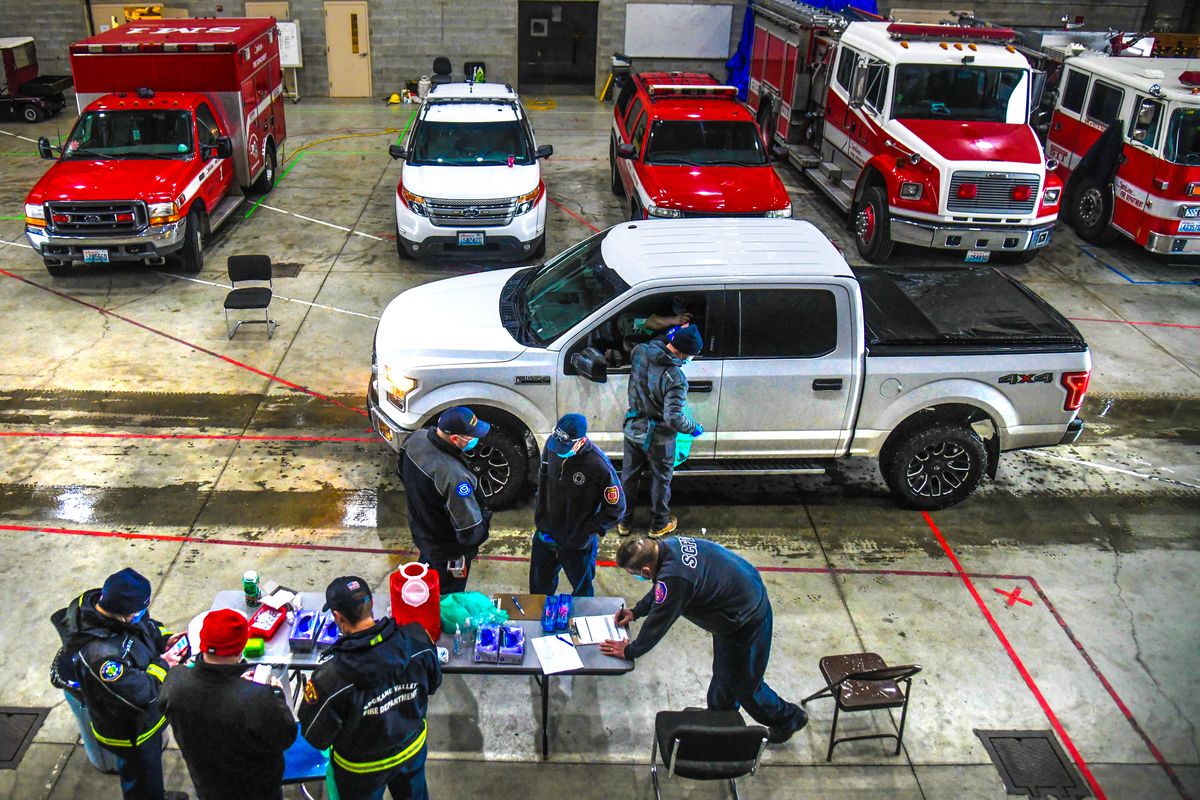Spokane first responders receive first dose of COVID-19 vaccine

A line of cars steadily pulled through the Spokane Fire Training Center on Monday morning as masked first responders leaned out their car windows for a paramedic to give them their first dose of the Moderna COVID-19 vaccine.
Getting the nearly 3,000 first responders in Spokane County vaccinated has been a long time coming, said Tom Chavez, medical services officer with Spokane County Fire District 8 and member of the first responder vaccine task force.
“We wanted to make sure that not only the community but our first responders were vaccinated because we have to go out every single day we see hundreds of patients,” Chavez said.
Chavez was up late the night before the clinic opened and up early Monday morning to make sure everything was set up to run smoothly.
“It was an anxious feeling to make sure everyone gets vaccinated,” Chavez said. “It feels a lot better now things are really smooth.”

First responders sign up for a vaccination time online through an app, then show up at the clinic at their designated time, present their paperwork, receive their shot and then wait about 15 minutes to make sure they don’t have an immediate reaction.
The clinic opened Monday as a collaboration between the Spokane Regional Health District and the Spokane County EMS and Trauma Care Council, which created the First Responder Vaccine Task Force.
The clinic is set to be open from 8 a.m. to 7 p.m. through Jan. 14.
First responders who are dispatched to emergencies, including law enforcement personnel, fire fighters, EMS providers and some support staff, are eligible for the vaccine, said Michael Lopez, integrated medical services manager for the Spokane Fire Department and member of the vaccine task force.
In partnership with the local health district, the task force was able to set up the infrastructure to administer the vaccine with paramedics and EMTs giving the injections.
“The the concept is if we get this process nailed down pretty well, then we can support the Spokane Regional Health District, in terms of community vaccine events,” Lopez said.
Nearly 40 people received a short training to administer specifically the Moderna vaccine. But Chavez said it’s not much different than giving any other type of shot.
After receiving his vaccination last week, Lopez said he felt a bit tired and achy at the end of the day, but after a full night of sleep he felt fine.
While the vaccination is available to all local first responders, being vaccinated is voluntary. At first, Chavez said, he was “hesitant” to get the vaccine with the discussion surrounding it and often unfounded community rumors. Chavez went to medical journals to do his own research before receiving his dose of the vaccine last week and vaccinating others.
“I wanted to support our first responders and let them know that I felt safe receiving the vaccine and hopefully that spurs them on in order for them to get the vaccine,” Chavez said.
Chavez and Lopez received their first doses of the Moderna vaccine last week and are due to receive a second dose 28 days later, Chavez said.
About two weeks after receiving the second shot, they will reach the target 90-95% immunity, Chavez said, meaning many first responders will not see the full benefits of the vaccine until March.
Chavez made it clear that there is still a risk for first responders to contract and transmit the virus despite receiving the first dose of the vaccine.
“I think it’s all about how you feel about what you’re doing now,” Chavez said. “So there’s not going to be any change for what I’m doing, still going to wear masks, we’re going to do social distancing.”
While not many things will change with the first dose, Chavez said it is still a step toward reducing the worry about bringing the virus back to his family.
“You always have in the back of your mind, was I the safest all day long? And that kind of wears on you, especially if you have a family to go to,” he said. “That is kind of why we’re doing this because we have our own families to take care of.”